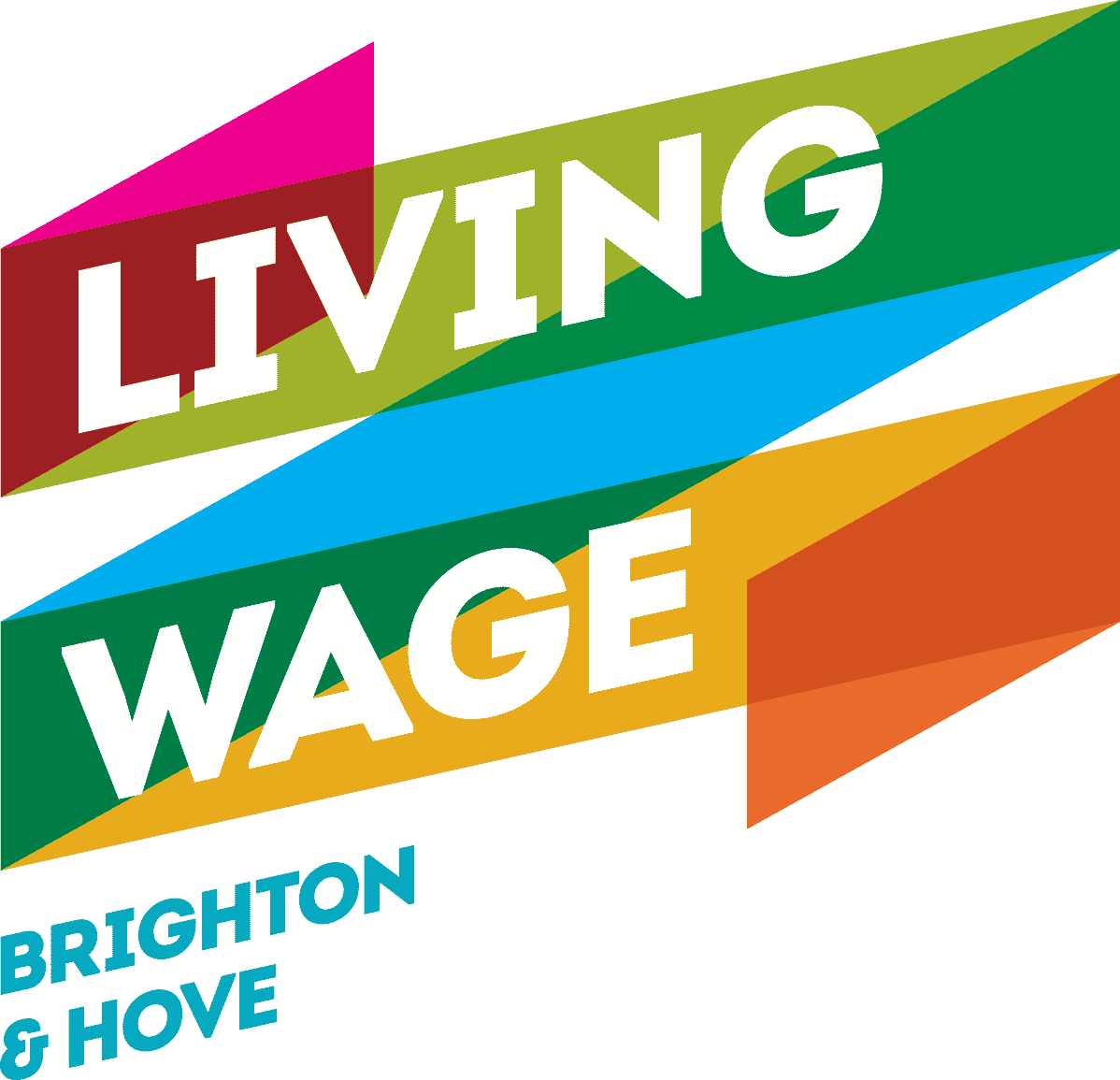SEO for Hotels
A Guide to Boosting Online Visibility and Guest Bookings
- Emina Demiri-Watson
- November 28, 2023
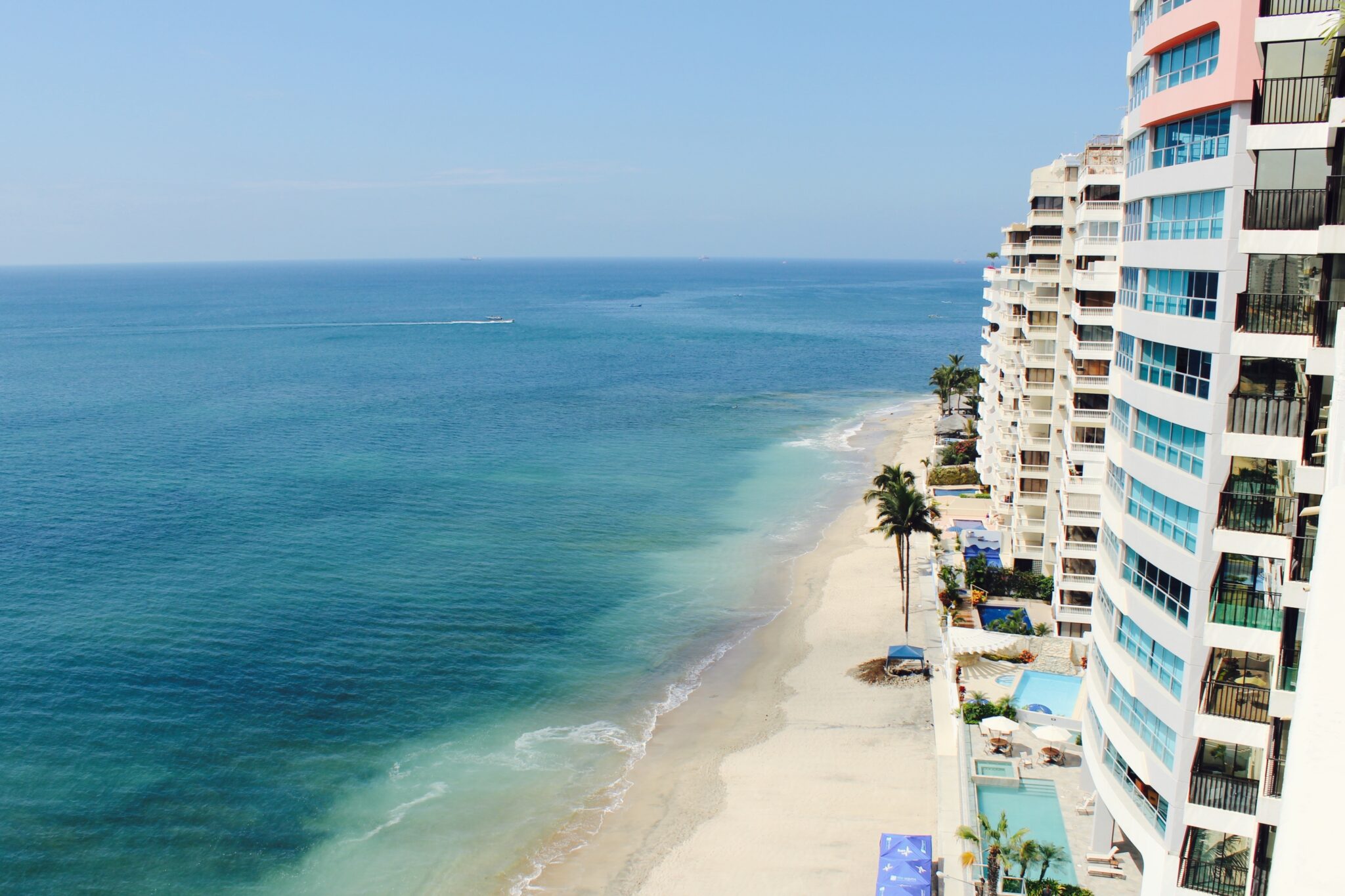
Whether you manage a luxury resort or a budget-friendly hotel, you’re probably looking to increase your bookings. And, ranking better on Google is one of the strategies that can get you there!
In this guide that has specifically been designed for hotels, we explore how you can:
- Increase your traffic
- Increase your visibility
- Increase your bookings
All using search engine optimisation (SEO) tactics!
From effective keyword research to measuring your SEO success, find out how you can get your hotel onto the digital map and earn more revenue as a result.
In this post
Why is SEO important for hotels?
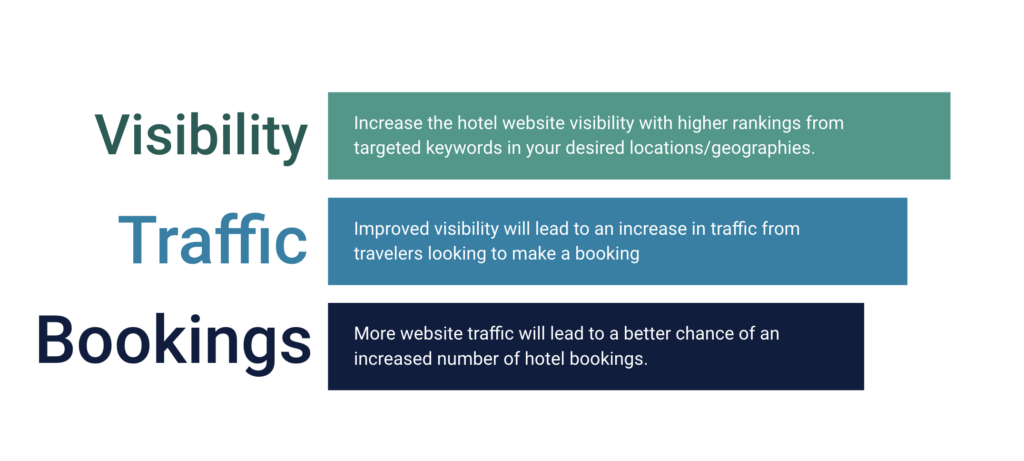
SEO or Search Engine Optimisation is an essential strategy in any hotel marketer’s toolkit. In today’s digital era, most travellers rely on search engines to research and book accommodation options. Ranking well on search engines is no longer nice to have; it is a must for any hotel looking to succeed in the hospitality market.
And SEO is a set of techniques that helps hotels gain the visibility needed to rank well in search. The equation is simple: more visibility (the right kind of visibility – but more on that later!) = more traffic (again relevant traffic!) = more bookings.
SEO is important to hotels because, ultimately, if done effectively, it has the power to:
Increase hotel visibility
Increase hotel website traffic
Increase hotel bookings
Easy right? Well, not really. But definitely worth doing.
With at least 187,000 hotels in the world as of 2023, the competition is fierce. But so is the reward. The global hospitality industry is estimated to be worth over a whopping $4.548 trillion as of 2022!
Visibility
Traffic
Bookings
Increase the hotel website visibility with higher rankings from targeted keywords in your desired locations/geographies
Improved visibility will lead to an increase of traffic from travellers looking to make a booking
More website traffic will lead to a better chance of an increased number of hotel bookings
How to do SEO for hotels
The question of how to do SEO for hotels is not a simple one. There is no such thing as a one size fits all SEO strategy in any industry, and hospitality is not an exception here. The strategy will depend on your goals, your budget, your audience, your location, and a ton of other factors that will be unique to YOUR hotel.
Having said that there are a few general requirements when it comes to hotel SEO and these can be divided into seven broad categories:
- Traveller target audience research
- Hotels’ keyword research
- Hotel SEO content strategy and on-site SEO
- Local SEO for hotels
- Technical SEO for hotels
- Hotel Linkbuilding and off-site SEO
- E-commerce SEO for hotels
- International SEO for hotels
Let’s dive into each and give you a bit of insight into how they can make your SEO strategies more effective.
Start with your traveller target audience
We can’t stress this enough! One of the most common mistakes we see hotels do is not starting with their target audience. Similarly, a lot of SEO agencies will skip this step and focus on this general idea of traffic and rankings.
But increasing website traffic without understanding your audience first is like setting sail on a vast ocean without a compass or navigation tools. You may be moving forward, but you need to figure out where you’re heading or who you’re trying to reach. You’re casting a net into the water without knowing what type of fish you’re trying to catch. And you might catch something, but chances are it won’t all be the desired catch, wasting your time and resources.
Understanding your traveller audience gives you that precise navigation system, enabling you to attract the right visitors who are genuinely interested in booking. Understanding your hotel audience allows you to create effective SEO strategies that will bring you results.
There’s been a lot of talk about audience personas and whether they are useful tools or not. But let’s not go into that one here. Whichever side you take, one thing is certain: as a hotel, you need to research and understand your audience to target them effectively.
While there are several ways to approach your hotel audience research, we recommend, at the very least, that you focus on understanding travellers:
- Demographics
Demographics are often the simple ones to start. Look at your current and past hotel guests and determine their age, gender, income level, occupation, marital status… Are there any patterns there? What do those tell you about their preferences and needs?
Unlike demographics, psychographics is more tricky but just as (if not more) important. Explore what data you have on their interests, values, and lifestyle choices. A good starting point to get an understanding of psychographics is to look at the hotel activities bookings. Your most booked activities will tell you a lot about the lifestyle choices and interests of your guests. Then, to get a fuller picture, layer this by reviewing your reviews, running surveys and examining third-party market research data into the hospitality sector.
- Travel Patterns
Closely related to psychographics are travel patterns. This includes an analysis of preferred travel destinations, frequency of trips and travel motivations. The tactics to gather this data is similar to psychographics data collection. One third-party resource you should definitely utilise here is the TripAdvisor Travel Index Results. They come in regularly and have a wealth of useful data on travel patterns.
- Booking Preferences
Part of a good SEO strategy is understanding how the traffic converts into bookings. This is where traveller booking preferences come in handy. Do your guests use online travel agencies, or search engines, or prefer direct bookings? Knowing this will help you decide which SEO tactic you should be investing the most in.
- Online Behaviour
This one is a no-brainer really. No SEO strategy can be built without first understanding how your audience behaves online. From initial analysis of what terms they could be using to search for a hotel to looking at user flows on your website, this information can tell you a lot about how to optimise your hotel website for search engine marketing (SEM).
- Seasonal Trends:
Seasonal trends, while they could fit under travel patterns and psychographics, also deserve a separate mention. Understanding the seasonal trends and travel patterns specific to your location will allow you to align your SEO with peak travel seasons or off-peak periods. Third-party data, like the aforementioned Trip Advisor report, is also useful here.
Hotels SEO keyword research
Armed with all the data collected from your traveller audience research, it’s far easier to take the next step: hotel SEO keyword research.
Previously, we’ve written what any industry should look out for when creating SEO-optimised blogs and the section on keyword strategy applies here as well.
In short, hotel keyword research is the process of discovering the keywords used by your guests to find your hotel. Your hotel keyword strategy is based on picking the most relevant keywords within your reach that have the right intent behind them and a good search volume.
The three terms you will need to understand here are:
- Search intent
- Keyword difficulty
- Search volume
Search intent
Search intent in SEO, in general, often gets boiled down into four main categories:
- Informational Search Intent: Users are seeking information or answers to specific questions. For example, someone searching for “tips for choosing a pet-friendly hotel” is looking for general advice on what to look out for when choosing the right hotel for their furry companion.
- Navigational Search Intent: Users are looking for a particular hotel’s website. For example, a brand search for “Marriott hotel website” indicates the user wants to navigate directly to their website.
- Transactional Search Intent: Users intend to perform a specific action, e.g. making a hotel reservation. For example, a search for “book hotel in Brighton” indicates the user is ready to make a transaction and find available hotel options in Brighton.
- Commercial Search Intent: Users are conducting research with the intention of making a future hotel booking. For example, someone searching “best family-friendly resorts in the UK” is looking for content about hotels in the UK that are great for family holidays because they are exploring options before making a final booking decision.
But things are often more nuanced. As SEOs, we also often look into other types of intent, such as:
- Local Search Intent – For example, someone searching “hotels near Times Square” is looking for hotel options in a specific area.
- Comparison Search Intent – For instance, a search for “differences between all-inclusive and boutique hotels”
- Review Search Intent – For example, someone searching “reviews of XYZ Hotel”
- Problem-Solving Search Intent – for example, “how to find the best hotel deals”
Understanding the intent will help you start thinking about the keywords you want to rank for as well as determine which keywords do go for after the research is done.
Your audience research comes in super handy here as well. All that work you did to understand their characteristics and behaviour will guide you in discovering the keywords in each intent category.
Many SEO tools these days will give you at least the initial four category breakdown of intent for any keywords. For example, SemRush has this. But be aware the intent is not always correctly determined by the tools. Always check the actual Google results as well to really understand the intent behind a chosen keyword!
Keyword difficulty
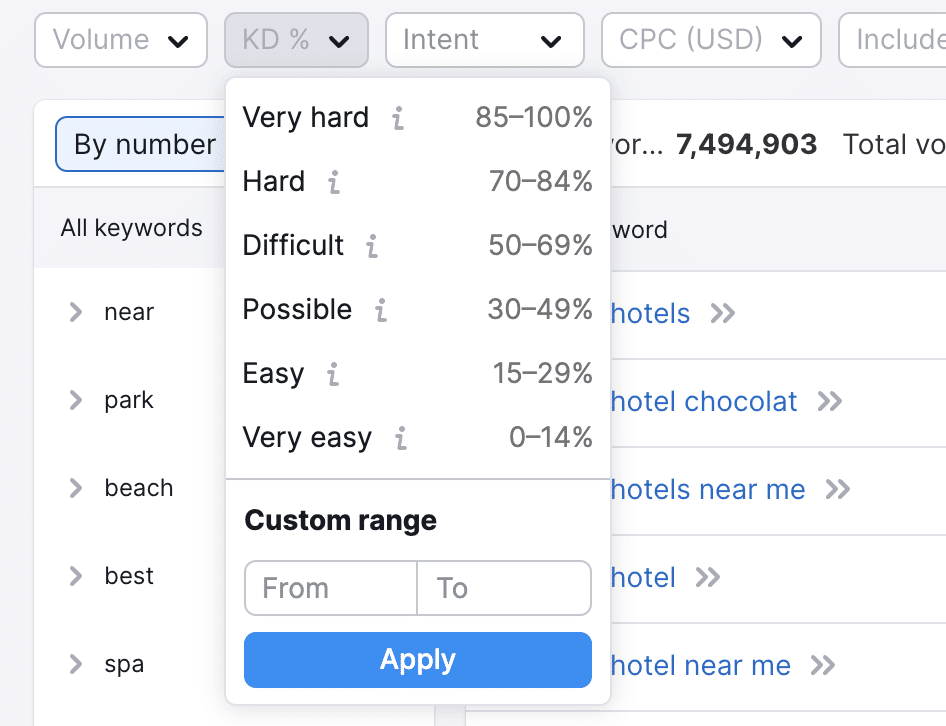
These days, ambitious hotels understand the value of SEO, so it’s not surprising that the competition for top rankings is tough. This is where keyword difficulty helps.
Keyword difficulty is a term used by many SEO management tools to show companies their estimate of how difficult they feel ranking for a keyword will be. How they determine this score will depend on the platform and will usually be a combination of factors such as the level of competition for a keyword, the authority of the competing websites, the content quality of the ranking pages etc.
REMEMBER:
The key here is that while this is a good number to be aware of, it’s not the be-all and end-all - it’s an estimate! While you want to be aware of this estimate, take it with a pinch of salt.
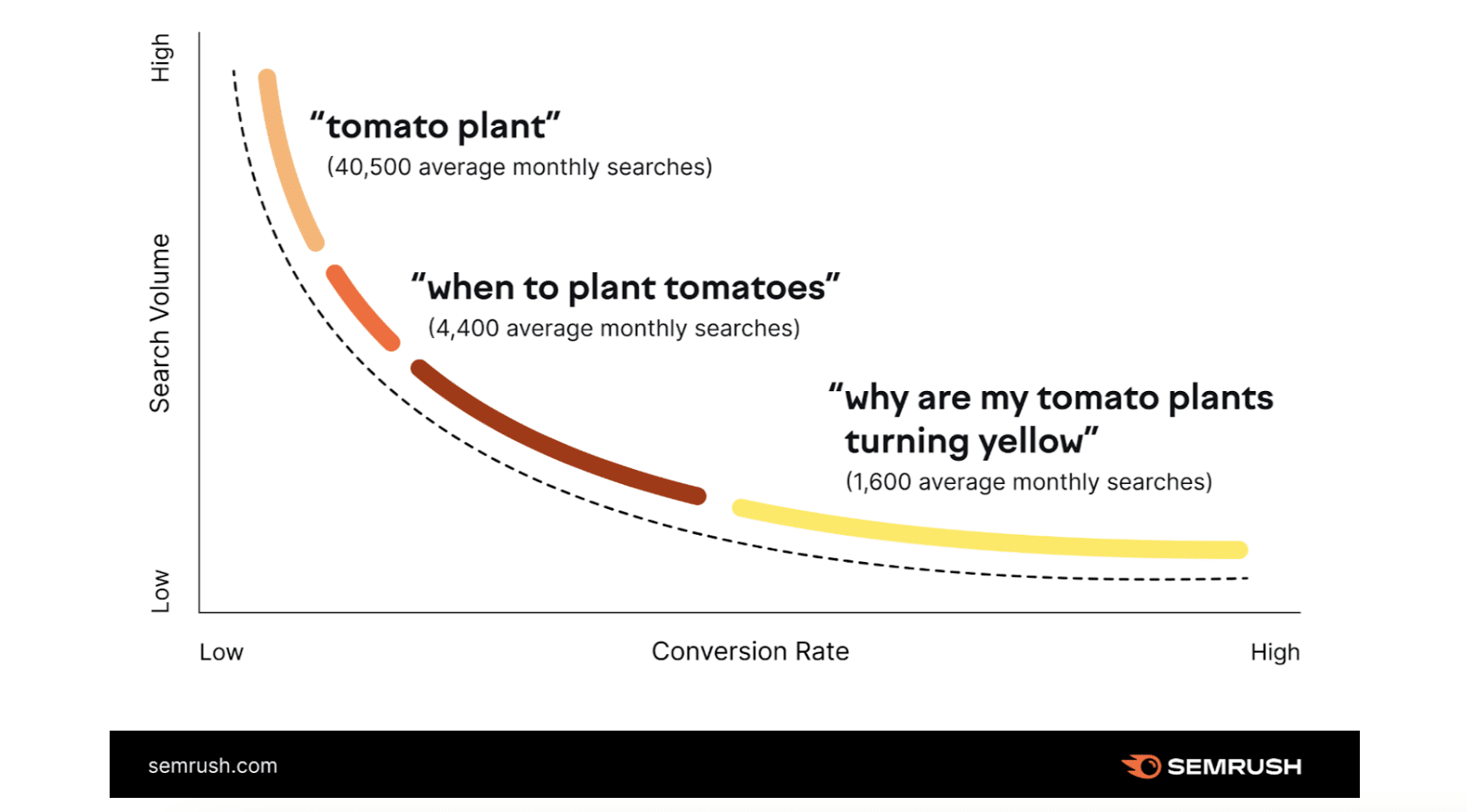
Volume
The third and final indicator you should look at to decide which keywords to go for, is volume. Search volume is an estimate used by SEO management tools to show companies how many monthly searches they can expect for particular keywords.
Again often, the keywords that have big volume are also the ones that have high competition. But they can also be the ones with low (eg. wide informational) intent.
Additionally, sometimes targeting 0-volume keywords makes a lot of sense if those keywords are high intent. Particularly since the 0 doesn’t actually mean 0 volume, it just means less than ten a month, which is the cut-off for most SEO management tools. Sometimes these keywords are the ones to get you the best leads, if the intent is good. In these cases, the intent will trump any volume considerations.
So what’s the secret to an effective keyword strategy for a hotel?
Understanding the importance of the three elements – intent, volume, and difficulty is a great starting point.
The secret is to find the right balance between search volume, intent alignment, and achievable competition. And to do this, you need to be clear on who your audience is and what your business goals are for SEO.
Additionally, ensure you don’t only focus on what we call short-tail keywords in the SEO world. Those are keywords that are one or two words long, usually have high volume but also are wide in intent and are often very difficult to compete for. For example, “hotel” is a short-tail keyword with 201.0K volume but the intent is wide, and competition is so fierce that targeting the keyword might be too difficult and have low returns. Users using this search term could be looking for a hotel in any city.
Instead, make sure your strategy includes long-tail keywords. Long-tail keywords usually have four or more words, and they are often less popular (the volume is not super high), but the intent is more specific. For example, “beachfront hotels in Brighton” has a volume of only 50, but the intent is more targeted. Travellers using this keyword are likely considering booking a stay.
Lastly, you will want to cluster the keywords that come out of your research. Keyword clusters are super important for SEO as they help you build topical authority, which signals to Google your hotel website should rank high. Kind of a “hey, we are the subject matter experts because we have in-depth knowledge of this topic”. This makes sense if you think about how users also search the web. Users can search for the same page in different ways.
For example, you might want to rank for:
“Family-friendly hotel amenities”
“Family games room”
“Kids hotel swimming pool”
You will notice all these terms have the same audience and the same intent. They would be grouped into a cluster that is, for example, called Family Amenities.
You will want to show Google and your audience that your hotel is a family-friendly destination by showing you understand all the keywords, questions and related terms for hotel family amenities.
Keyword clustering is also useful for prioritising keywords. The intent, volume and difficulty elements work on a closer level as well. Rather than focusing on individual keywords. Your strategy should use the clusters to show where the biggest opportunity is. The clusters that have the best balance of the three elements should be prioritised first.
Hotel SEO content strategy
The next critical element of an effective SEO strategy for hotels is content. How successful your content strategy is will largely depend on the quality of your keyword research. If your keywords and clusters haven’t been chosen strategically, your content won’t be targeted, either.
All your content should keep in mind Google Quality Rater Guidelines. Remember when we said you want to show Google you are a subject matter expert in a topic? These guidelines will tell you how to do this. The Google Quality Rater Guidelines are how the algorithm recognises website quality. Understanding this will help you position your website for better ranking.
While it’s worth taking a look at the whole document (it’s a whopping 176 pages long in its current iteration!), the acronym that you absolutely need to know about it E-E-A-T.
E-E-A-T. stands for experience, expertise, authoritativeness, and trustworthiness. Quality content hits all four of these! Your content should build the authority of your website in the keywords and topics you chose in your keyword research. And, with each piece, you should demonstrate EEAT.
For hotels with existing websites, your content strategy will broadly be divided into two areas:
- Existing content
- New content
Existing content strategy
If you already have a website, chances are you already rank for some of the terms that came out of your keyword research. For example, maybe your hotel is in Brighton, and you rank well for some local terms, such as “hotels in Brighton”.
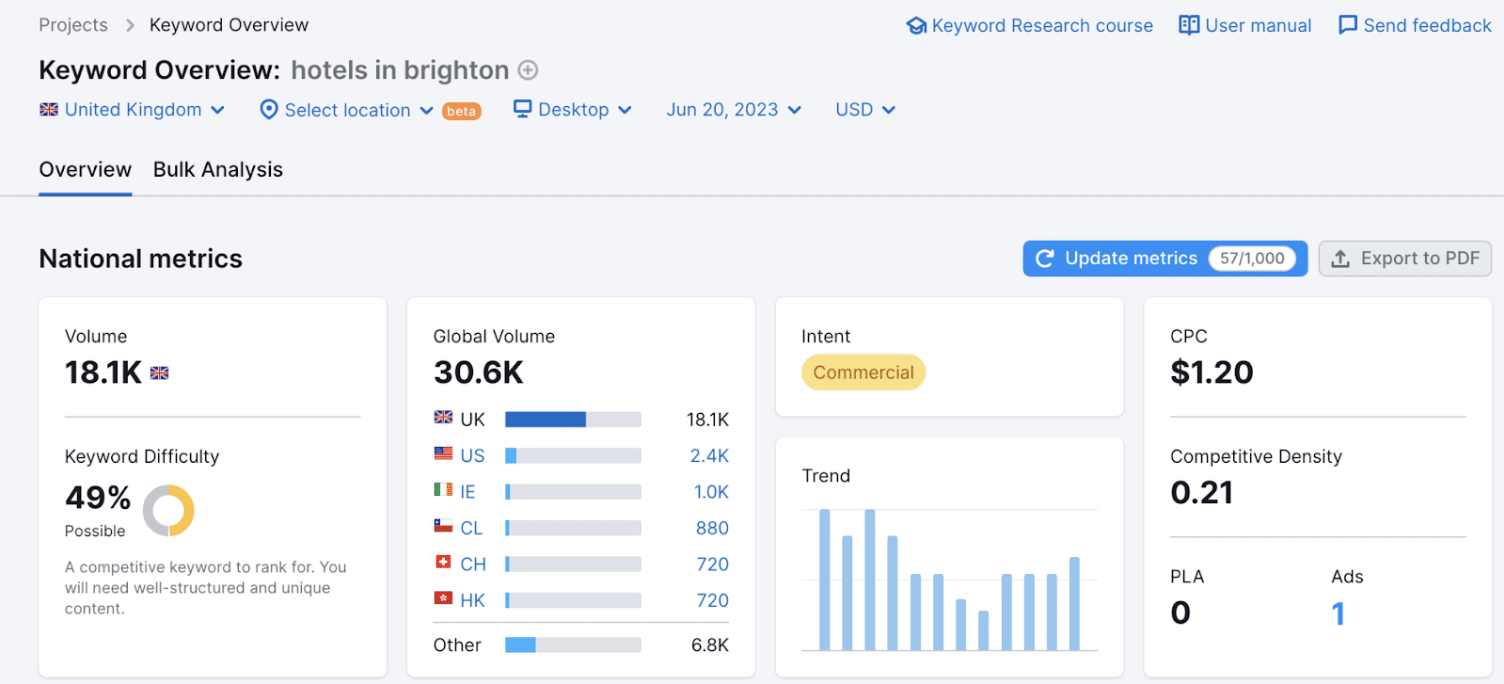
This is where keyword mapping (or content mapping) comes in.
Keyword mapping, to put it simply, is the process of assigning a keyword or keywords to your page. Sometimes your page will rank for more than one keyword, of course. This is fine as long as you decide what your primary keyword is.
The process of mapping your keywords to pages will help you discover which pages you should optimise first. It’s a great way to find that “low-hanging SEO fruit”. Those pages that already rank for good keywords but are on page 2 or in positions lower than the first three. This will be your initial hit list, and you will want to start optimising those for better ranking right away.
Optimising existing content entails a wide range of things. From basics such as optimising your headings so they include the target keywords to making sure you are maximising on EEAT. What you want to avoid though is relying only on SEO website plugins such as Yoast or AllinOneSEO to tell you if your content is optimised. Just because the plugin gives you the green light doesn’t mean your content will rank!
New content strategy
You’ll find that your keyword research comes out with keywords and topics you don’t rank for at the moment, but that is an excellent opportunity to get more relevant traffic and bookings. To target these keywords, you will need new content.
The best way to approach new content creation for your hotel is to create a content calendar for the next six months. We recommend you don’t plan for a whole year (unless you have a big content team!) because you will want to stay agile to use that time for other SEO tasks. A content plan is a list of content you will produce mapped against the topics and keywords you want to rank for.
There is quite a lot of talk out there about how much content hotels should be producing a month to improve rankings. Some SEOs will say you need to publish content every day to rank better. This is not correct. Keeping your website updated with new content or changing existing content is a positive signal to Google and will help get your hotel website crawled more regularly. The breadth of insight into a topic also signals to Google you are expert in the field, which helps rankings. But there are no set guidelines on how much you should produce or how often you should update. It’s more important for the content to be of high quality.
A note on pillar pages
One of the terms often used in SEO is pillar pages. The topics you decide to cover in your keyword research could be approached using pillar pages. A pillar is a single page that covers a topic in-depth and is linked to several other pieces of content that cover specific areas of the topic.
For example, if your topic is Family amenities, your pillar page (let’s call it “The ultimate guide to family-friendly hotel amenities”) would target the keyword “Family-friendly hotel amenities” and link to several blogs that cover specific areas such as games rooms, family hotel rooms, kids swimming pools….
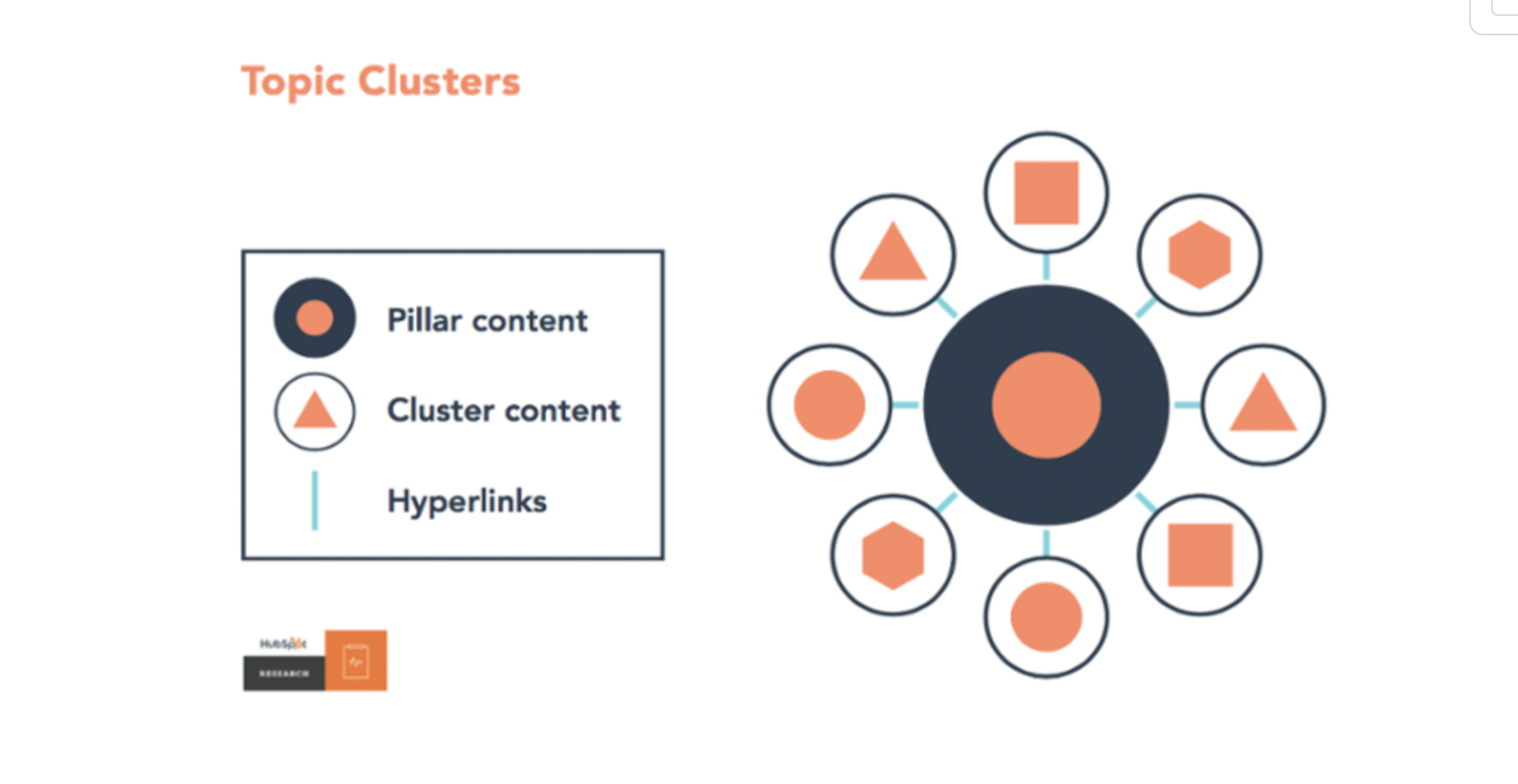
Pillar pages are a great SEO strategy for a few reasons. Specifically, they provide:
- Structure and organisation – a great way to organise your topics in one place
- Better user experience – navigation is easier, which reduces bounce rates and increases engagement.
- Internal linking -linking several pieces of content improved crawlability and indexation
- EEAT – demonstrating EEAT on a particular topic level improves search rankings.
- Long-tail keyword targeting – Pillar pages target broad keywords, while subtopics target specific queries.
What about using AI for your hotel content production….
Unsurprisingly, the hotel SEO industry is also dipping its toes into using AI in content production. Tools such as ChatGPT are an excellent opportunity for hotels to save time and reduce costs. But be careful how you use it!
In their guidelines Google states:
“Appropriate use of AI or automation is not against our guidelines. This means that it is not used to generate content primarily to manipulate search rankings, which is against our spam policies.”
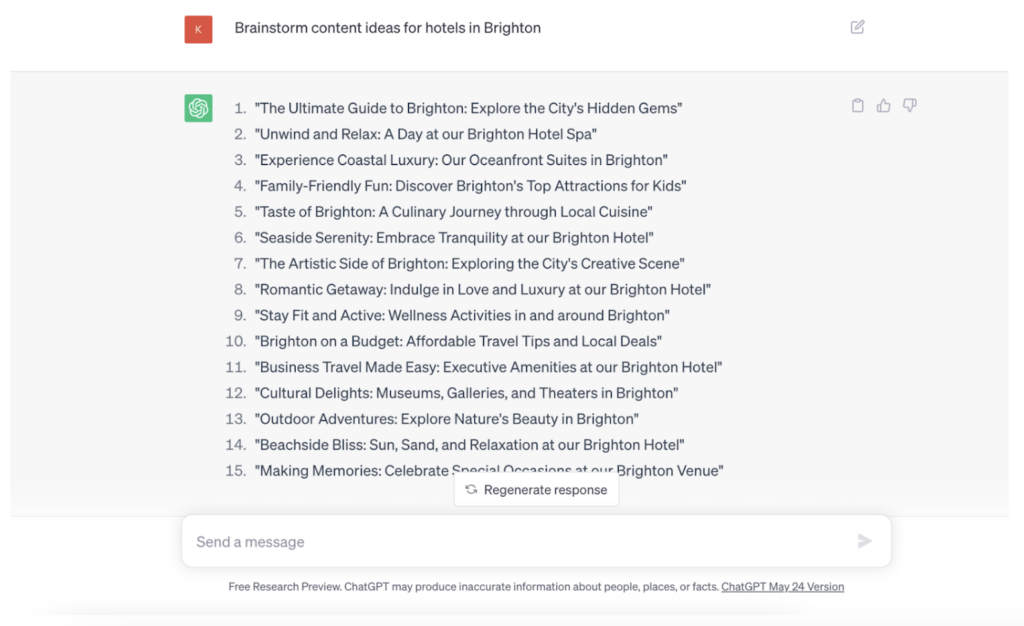
The key term here is appropriate use. You should avoid using it to write your pages and blogs. Instead, think of it as your personal assistant. A few things we found ChatGPT to be useful for are:
- Brainstorming content ideas
- Getting hotel keyword strategy going by suggesting topic keywords
- Brainstorming high-level set of tactics for a hotel content strategy
- Helping us better understand search intent beyond keywords
Local and international SEO for hotels
Let’s face it, it is very likely that you want to attract international as well as local bookings for your hotel. This is where two distinct SEO strategies come into play:
- Local SEO
- International SEO
Local SEO for hotels
Local SEO is a set of SEO tactics that will help hotels become more visible in local search results on Google. In other words, it helps hotels reach and attract potential guests in their specific geographic area. Let’s say you own a hotel in Brighton and you want to attract people searching for “hotels in Brighton”. Local SEO tactics would help you target that keyword effectively.
A few local SEO tactics that are a must for any hotel are:
- Getting your hotel Google Business Profile up and optimising it (including getting as many positive reviews as possible!)
- Levering location targeting in your content – from using the keyword in your H1s and metadata to showing E-E-A-T when it comes to Brighton as a location and creating location-specific website pages
- Getting listed in local directories and citation sites
- Adding local business schema markup to your website
International SEO for hotels
As the name itself suggests, international SEO is a set of tactics that will help hotels optimise their website for the different countries and languages they are targeting. Let’s say you own a hotel in Brighton UK but you want to target Spanish travellers, you might want to use international SEO tactics to help you rank better in Spain.
There are several international SEO tactics your hotel could implement, some of those are:
- Conducting keyword research that is target-market driven – identifying relevant keywords and topics in different languages and structuring your strategy around those
- Creating a multilingual hotel website -this can improve the user experience for specific countries and increase visibility in local search engines
- Developing localised content – includes translating your website content, blog posts, and guest reviews into the local language to make it more accessible and relevant to international visitors.
- Implementing Hreflang Tags – notoriously tricky to set up correctly! Hreflang tags help search engines understand which version of your website to display to users based on their location and language preferences.
Technical SEO for hotels
Another very wide but super important area of SEO is technical SEO. Technical SEO is basically a set of tactics that will make your website easier for search engines to crawl and index.
Without a strong technical foundation, your hotel website won’t rank well on Google. In fact, we’ve seen situations where a website was not ranking at all because of technical issues!
There are several tools out there that can help you analyse the technical side of your hotel website. We usually use a combination (Google Search Console, Screaming Frog, SemRush…) plus take a deep dive into the code of the website.
Technical SEO can be a rabbit hole to get lost in with so many different elements you could look at! At the very least we recommend you focus on:
- Robots.txt – Super important to check! Robot.txt guides search engine bots on which pages of your website should be crawled and indexed. This is where we’ve seen at times directives that are basically stopping search engines to crawl a site at all!
- Your XML Sitemap – helps search engine bots crawl and index your website more efficiently, improving your visibility in search results.
- Schema Markup – schema markup is a great way to enhance your search engine listings with rich snippets and improve visibility. Don’t just stop at basic structured data about your hotel, such as location, amenities, and pricing. Fetch TripAdvisor reviews and show them as rich snippets in Google! According to the latest TripAdvisor figures, reviews have grown by +20% from 2020 levels to 30.2 million. Review schema is a great opportunity for hotels to use technical SEO to improve their rich snippet rankings!
- Mobile-Friendliness – With the increasing use of mobile devices for travel bookings, it’s essential that your site displays properly on smartphones and tablets.
- Canonical Tags – Implement canonical tags on your hotel’s website to indicate the preferred version of duplicate content.
- URL Structure – Use clean and descriptive URLs that include relevant keywords. This not only improves the user experience but also helps search engines understand the content of your pages.
- SSL Certificate: Secure your website with an SSL certificate to ensure all data transmitted between your website and users is encrypted.
- Site Architecture – Create a clear and logical site structure with proper navigation menus, internal linking, and breadcrumbs. This helps both users and search engines understand the organisation of your website. How you organise your site architecture is particularly relevant for bigger hotel brands that have one central brand website. Most hotels used to have separate websites for their brands. Today, rightly so, most have one website that includes properties as a subfolder. This of course is a much more complex architecture to get right!
- Website Core Vitals – check your website core vitals but don’t file a vast amount of money into improving them and don’t trust agencies that only focus on this! Website Core Vitals are not part of search engine ranking yet but they do impact user experience.
Hotel link building
Widely speaking we can divide website links into two categories:
- Internal links – we spoke a bit about this previously. It is super important for your hotel website to have a logical and helpful internal linking architecture. A great internal linking strategy helps users and bots navigate the website effectively which in turn provides a better user experience and has an impact on rankings.
- External links – external links can be links from your website to other websites but also these are links other websites have that point to yours. When you hear SEO-ers talking about the latter, they usually use the term Link building.
Link building, as it says on the tin, is the process of getting other websites to link to your website. These links are called backlinks (as they link back to you!). Two other terms to explain at this point are the two types of links you can gain:
- Dofollow links
- Nofollow links
The difference and the existence of the two terms have a lot to do with Google and how the ranking algorithm treats them. While there is no such thing as ‘link juice’ (often used in the SEO community to explain why linking from one site to another can help build authority in Google), not every link is treated the same. Dofollow links Google treats as a ranking factor. They are links that build trust and authority for your website. It becomes murkier with Nofollow links. There is some debate in the SEO community as to whether having a Nofollow link is beneficial for rankings. Our verdict is: while it’s not a ranking factor, it is still ok to have Nofollow links as long as you didn’t spend effort and money on building them.
Or as Danny Sullivan from Google would put it….
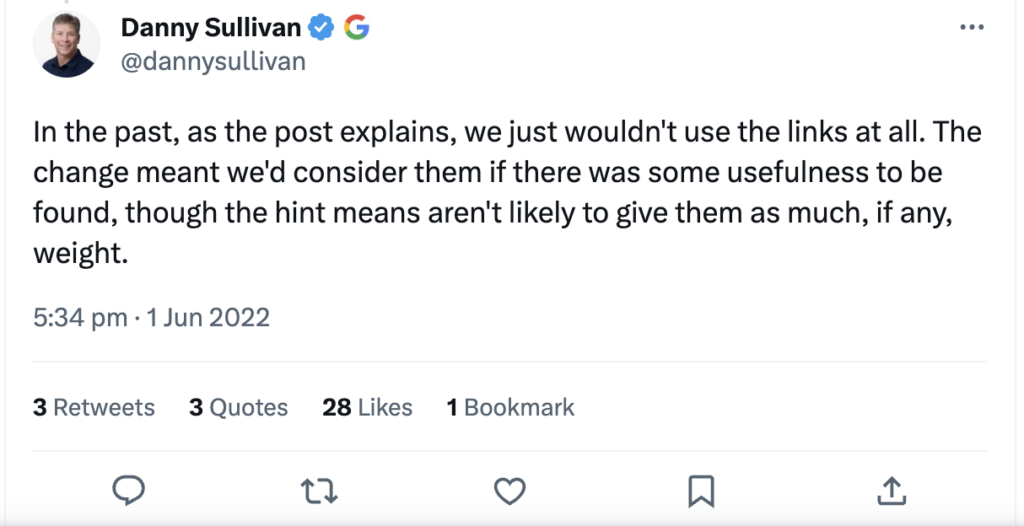
When combined with technical SEO and high-quality content, link building can be an incredibly effective SEO tactic for improving your hotels’ domain authority whilst driving more organic traffic to a website. The main focus of your link-building strategy should be to acquire quality, relevant and authentic links. The aim is to build long-term success in search engine result pages (SERPs), and building high-quality links is the best way to do this.
There are several link-building strategies your hotel could try out. The ones we recommend for acquiring high-quality backlinks include:
- Organic link building
The best way to build your links is actually through providing excellent content and investing in brand awareness. If your content is helpful it will get picked up by websites that will link to it. If your hotel brand is built effectively, you are likely going to pick up links naturally. For example, you could get featured in lists of best hotels in your area.
- Digital PR
Digital PR is not just link building but it is often used for link building. Digital PR is a set of tactics aimed at increasing a brand’s online presence which, among other things, includes link-building tactics. For example, you own a hotel in Brighton and using original research on Brighton traveller behaviour that’s distributed to all local media outlets you land a link in the Brighton Argus.
Other strategies you might want to consider for your hotel include:
- Brand Mention link building – as the name suggests, this strategy is around finding those sites that mention your hotel but don’t link and asking them to add one.
- Directory link building – there are directories out there that will still add a Dofollow link to their directory.
- Broken Link building – this strategy is basically looking at links you had before but that are currently not there. It can be a great strategy but it is really up to the linking site if they add the link back.
- Link Intersect – in a nutshell, finding who links to your competitors, other hotels, asking those websites to link to you as well.
E-commerce SEO for hotels
These days many hotel websites are build on an e-commerce platform that enables travellers to book a room and pay for it directly on the website. It’s a great way to keep track of the impact your SEO has (more on that later) but it does come with it’s own set of suggestions when it comes to SEO.
Even if your hotel website is an e-commerce site you will still need to do the SEO tactics mentioned previously. For example, your keyword research will tell you a lot about how to optimise your e-commerce pages.
Another element that is super important here is the user journey. Whichever booking system you use, you will need to plan for a seamless user journey for your guests from the moment they land on your website to the moment they press Book.
From room descriptions that are optimised to adding amenities and FAQ, your e-commerce pages need to answer all the questions and needs your guests might have effective. You then need to lead those guests to click the Book CTA. And, finally once there you need to ensure there is no friction present that can prevent your guest to complete the booking. Things to consider here is decluttered booking experience with not many distractions and a safe and quick payment system.
Tracking hotel SEO success
Spending time and effort on your hotel SEO strategy won’t mean a thing if you can’t track the results. Which key performance indicators (KPIs) you track will depend on your individual goals and needs. But, you will want to track at the very least two indicators:
- Rankings
- Hotel traffic
- Conversions eg. Direct hotel bookings
Even basic result tracking such as this will give you answers to the most important question: Is SEO bringing traffic and what kind of traffic is it bringing?
Rankings
As the word itself suggests, measuring rankings is measuring how well your website ranks on search engines on a keyword or a topic level.
This is done using an SEO tool and is depicted in positions eg. position 1-3, 3-10…. Of course, the higher your ranking the more chances you will have to get traffic onto your website.
Easy right? Well, not really. But definitely worth doing.
With at least 187,000 hotels in the world as of 2023, the competition is fierce. But so is the reward. The global hospitality industry is estimated to be worth over a whopping $4.548 trillion as of 2022!
One of the common mistakes that we see when it comes to managing hotel SEO is the focus on rankings only.
Rankings are great to track but rankings also won’t give you the real impact on your business.
Things get even more complicated if we are talking about large hotels with one central website that handles all the different franchises and/or thousands of pages across multiple locations.
You will still want to track this in conjunction with the other two measures.
REMEMBER:
Make sure you tag your keywords in your SEO tracking tool. This will allow you to later track rankings in a segmented way. For example, if one of your topics is Family amenities, you will want to tag all keywords with this in your tool. This will then allow you to segment all related terms and see how your efforts are moving rankings in this particular topic.
Hotel traffic
Tracking your hotel traffic using Google Analytics 4 is a no-brainer. GA4 will give you a basic insight into who is visiting your website in the Acquisition reports.
There are 3 reports to focus on here – and all will segment your data into different channels, including search:
- Acquisition overview – as the name itself suggests this report is your traffic overview. Here you will see basic data on how users are coming to your website.
- User acquisition – this report will show you how users discovered your website the first time around. So for example, someone searches for “hotels in Brighton” and lands on your website as a user.
- Traffic acquisition – this report will show you the most recent source/medium before a session. It tracks return visits as well as new ones. For example, that same user comes back to your website using a link in an email and this report attributes this traffic to email.
Of course, there are more advanced things you might want to do here such as segmenting your traffic by building custom audiences, but as a basic setup, these are the reports you will want to check out first.
If you haven’t set up GA4 yet here’s a useful GA4 checklist!
There is no doubt that measuring traffic to your hotel website is key to understanding how your search engine optimization strategy is working. But it alone won’t give you answers to one very important question: What’s the quality of this traffic?
This is where the third must-have KPI comes in….
Conversions eg. direct bookings
One of the ways to differentiate SEO service providers is to look at whether they include conversion tracking into their offering. It is all well and good to drive traffic to your hotel site but if you are not tracking conversions you won’t know if that traffic is actually making a revenue impact.
This is where you need to understand how conversion set-up works. There are 2 basic setups we see with clients:
- Setting up a booking form conversion using your confirmation page – this one is easy. All you need to do is create a custom Event using the confirmation page url in GA4 and mark this as a conversion.
- Setting up a booking form conversion without a confirmation page – things here get a bit more complicated. You will ideally want to use Google Tag Manager to set this up. Google Tag Manager (GTM) is a great free tool that lets you install, store, and manage marketing tags without modifying website code. In this case, you will need to use GTM to set up what’s called a click-tracking tag to track for example when someone clicks on the Book Room button on your website. Once the tag is set in GTM you will want to bring that in as a conversion into your GA4 property
Confirmation pages are not only great because they make things simple and they are a brilliant opportunity to upsell and cross-sell other hotel services. However, even if you have a confirmation page you should still use GTM for other tracking and SEO in general. Google Tag Manager should be part of any digital marketer's toolkit. It makes the process of tracking much simpler and it also enables your site to be more technically SEO-friendly.
Things will get slightly more complicated with the introduction of Google Analytics 4 that will soon be replacing Universal Analytics (UA). But again, as long as you have a thank you/confirmation page, a simple set-up is possible.
Tracking conversions is also recommended if the hotel has an e-commerce site. There is a migration option from Universal Analytics’ Enhanced E-commerce which you can use to migrate data to GA4. However, keep in mind that the model that UA uses is different then GA4. It is advisable you set things from scratch using GTM instead, which is where it gets a bit more complicated for e-commerce.
Some hotels will also have their own booking systems and/or will utilise phone tracking. Regardless of your setup and how complicated it may be, one thing is certain: you will want to track conversions otherwise you can’t know what the impact is of your SEO strategy on your bottom line.
Our Hotel SEO services
Bottling up decades of experience in SEO is impossible in one guide. Hopefully, this piece gives you at least a starting point. If you are looking for some support with your search engine optimisation for your hotel, we offer a range of SEO services that might be of help!
Are you looking to increase your bookings using paid advertising? Check out our PPC for travel industry: A Guide For Hotels And Hostels.

